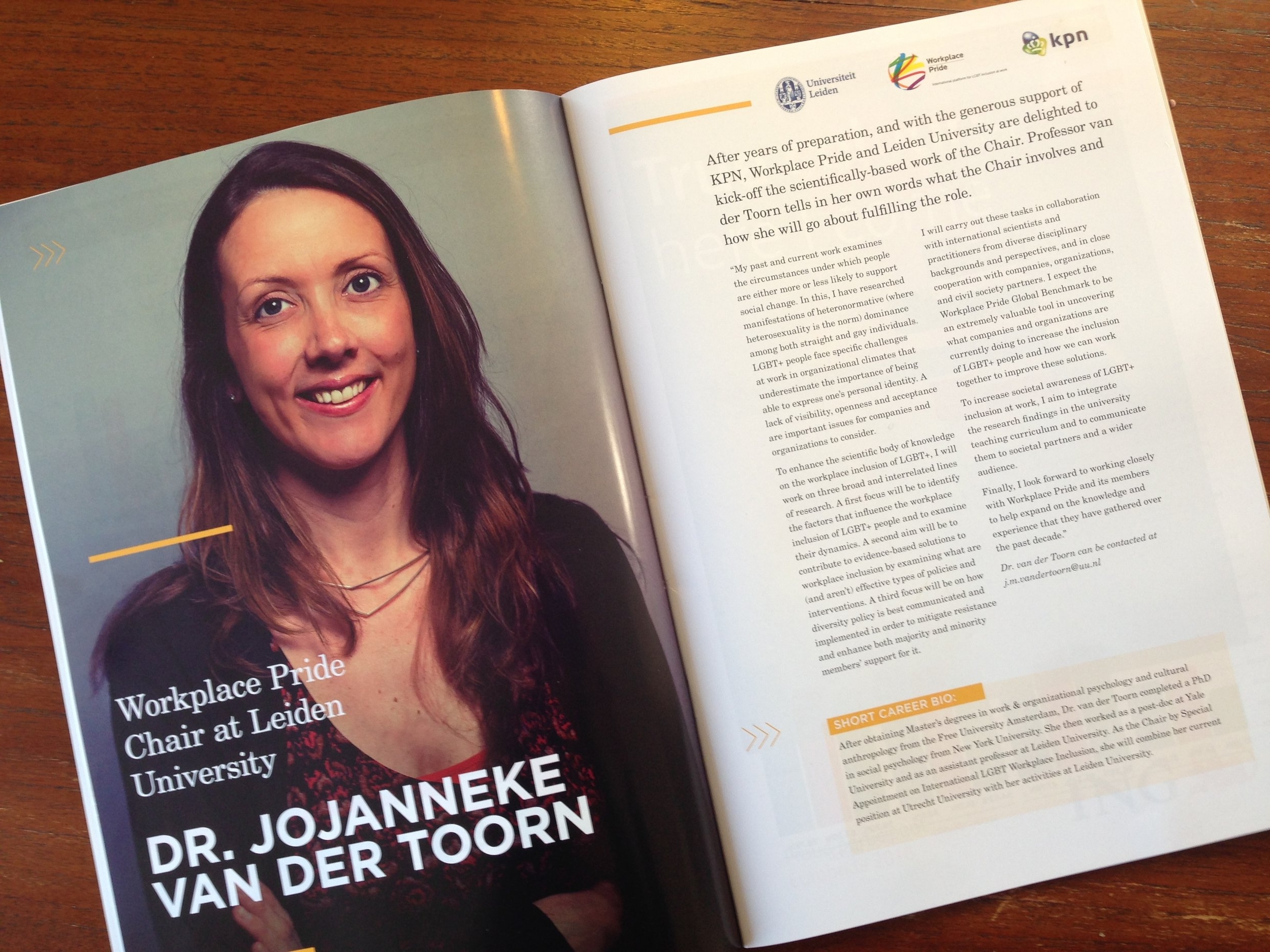Last Thursday, I gave a keynote lecture during the Rotterdam Pride Seminar MIND THE GAP as one perspective on the question of how to make Rotterdam safe for LGBTI people.
Join the upcoming Political Psychology Platform meeting
Political Psychology Meeting
October 26 2017
Program
10.00-10.30 Coffee and Tea
10.30-11.30 Rene Bekkers (Free University Amsterdam – Sociology)
Mega-analysis of generalized social trust
11.30-12.30 Honorata Mazepus (Leiden University – Public Administration)
How are citizens’ judgements about international cooperation shaped?
Experimental evidence from the Eastern periphery of Europe.
12.30-14.00 Lunch
14.00-15.00 Mark Brandt (Tilburg University – Social Psychology)
Belief system networks.
15.00-16.00 Alessandro Nai (University of Amsterdam – Political Communication and
Journalism)
Charismatic leaders, provocateurs, or drunken dinner guests? Personality
reputation of populist and non-populist candidates worldwide.
16.00-17.00 Drinks
EASP 2017: Organizational Behaviour and Gender
I had the pleasure of chairing the symposium “Organizational Behavior and Gender” at the 18th General Meeting of the European Association of Social Psychology (EASP). During this symposium I presented my work “Resisting Change: The Joint Influences of System Justification and Self-Interest on Diversity Policy Support”. In two studies, we found that system- and self-serving motivations jointly influence people’s diversity attitudes.
Want to see more? Some interviews and keynote lectures from GM EASP 2017 can be found here.
Publication: Comfortably Numb
Alexandra Suppes presented our work “Comfortably numb: The palliative effects of system justification on the health and happiness of members of the LGBTQ+ community” during the Hierarchies and Inequality symposium at the 18th General Meeting of the European Association of Social Psychology (EASP) in Granada, Spain.
This research shows that members of sexual and gender identity minority groups are buffered in their well-being if they deny that their group is discriminated against. After accounting for personal discrimination respondents have faced, denial of LGBTQ+ group discrimination is associated with greater subjective well-being and health.
You can now access the full paper here.
Keynote at Workplace Pride Conference 2017
“Why is your sexuality or gender identity relevant in the workplace?” This was a central question during my keynote lecture during the yearly Workplace Pride International Conference in Brussels, which centered around the theme of “Building Bridges”.
You can read some coverage of my lecture in Dutch or English.
Keynote at European Commission in Brussels
Today, on the International Day against Homophobia and Transphobia (IDAHOT), I gave a keynote lecture at the lunchtime conference on LBGTI workplace issues at the irectorate General of Human Resources and Security of the European Commissio in Brussels, Belgium.
In light of LGBTI equality, a factsheet on the perception of LGBTI equality in the EU can be found here, a more detailed report can be found here.
Special Chair for the Workplace Inclusion of LGBT
I am excited to announce that starting January 1st 2017, I will be taking up a new position as the Workplace Pride Chair at Leiden University!
The Workplace Pride Chair is instituted by the Workplace Pride Foundation and Leiden University with the generous support of KPN and provides a focused and scientific approach to studying and improving LGBT inclusion in the workplace both domestically and internationally.
As the Chair, I intend to work on three broad and interrelated lines of research. A first focus will be to identify the factors that influence the workplace inclusion of LGBT+ people and to examine their dynamics. A second aim will be to contribute to evidence-based solutions to workplace inclusion by examining what are (and aren’t) effective types of policies and interventions. A third focus will be on how diversity policy is best communicated and implemented in order to mitigate resistance and enhance both majority and minority members’ support for it.
I will be combining it with my position at Utrecht University so am unlikely to get bored :)
Read more here
Is training aimed at reducing prejudice effective?
A new report by the Knowledge Platform Integration and Society (KIS), in which I was involved as expert consultant, is out examining the plausibility of prejudice reduction training. The most important conclusion? That the effectiveness of such an intervention depends on who is training, who is being trained, and what the objective of the training is (raising awareness, reducing prejudice or changing behavior).
Psychological barriers on the road to effective diversity management
On October 28, I gave a research talk at the Gratama foundation to share my progress since receiving the Gratama Science Prize in 2015.
To this end, I shared with them my social psychological approach to studying support for diversity policy and some preliminary results from recent experimental studies we conducted at Leiden University.
A social psychological approach to studying individual attitudes and behavior
Conference LGBT Research in the Low Countries
I attended the first ever Conference "LGBT Research in the Low Countries" today, organized by the Flemish-Dutch Network LGBT Research and taking place at the University of Antwerp, Belgium. It was a very interesting and fun day, featuring state of the art research in this interdisciplinary area and allowing plenty opportunity for networking and exchange.














